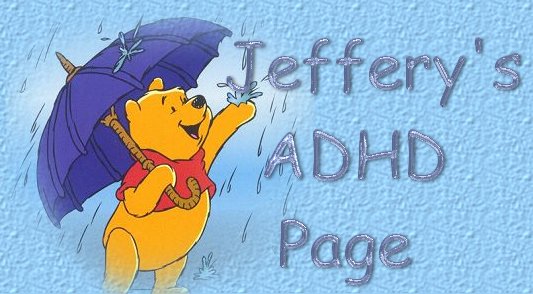


This page is dedicated to my son Jeffery, who has ADHD. He was diagnosed with ADHD, mild mental retardation, strabinus, mild heart condition, delays in fine-gross motor skills, speech, cognitive, social, has a distal rotation of the right hip. He failed to thrive as an infant, has the bone structure of a 5 year old, has elfin like facial features. He had nine fillings, six caps on his teeth by the age two.
We have had several evaluations for a childhood syndrome, but, the only thing we come up with is Williams Syndrome. Even thought the deletion of the long arm of chromosome seven was not obvious everyone still believes this is his diagnosis. I will go further into Childhood disorder's later. Right now I want to cover ADHD. A more common condition we all fear. After living with ADHD for the past seven years. I don't even want to think about it either. I hope you will find this information useful. Please direct any comments or questions to my email or ICQ.

THE DIAGNOSIS OF ADHD/ADD
In the most current assessment guidelines published by the American Psychiatric Association, Diagnostic and Statistical Manual for Mental Disorders IV (DSM4), the disorder is known as Attention Deficit Disorder and has several types including: (1) predominantly inattentive; (2) predominantly impulsive or (3) combined. Individuals with this condition usually have many (but not all) of the following symptoms:
Inattention:
often fails to finish what he starts
doesn’t seem to listen
easily distracted
has difficulty concentration or paying attention
doesn’t stick with a play activity
Impulsivity:
often acts without thinking & later feels sorry
shifts excessively from one activity to another
has difficulty organizing work
needs a lot of supervision
speaks out loud in class
doesn’t wait to take turns in games or groups
Hyperactivity:
runs about or climbs on things excessively
can’t sit still and is fidgety
has difficulty staying in his seat and bothers classmates
excessive activity during sleep
always on the "go" and acts as if "driven"
Emotional Instability:
angry outbursts
social loner
blames others for problems
fights with others quickly
very sensitive to criticism

The diagnosis can be made by "ruling out" other medical or psychiatric causes for the symptoms and by then determining that the patient meets the DSM4 criteria for Attention Deficit Disorder. In some cases psychological testing is also used to help determine the diagnosis. The testing may be in the form of questionnaires such as the Conners Rating Scale or the Child Behavior Check List. Sometimes, a computerized neuropsychological test such as the TOVA, IVA or Gordon Diagnostic System may be used. These tests are known as continuous performance tests and measure a person’s ability to pay attention, tune out distractions and their impulse control while performing a repetitive task over a period of time ( 6 to 15 minutes). This type of testing can be helpful. More extensive batteries may be offered by various practitioners but are not necessary to provide the necessary data to make a diagnosis.


Love your mommy

True Attention Deficit Disorder patients usually start showing symptoms by the time they start school. Some very impulsive children are diagnosed as early as 2 or 3 years old. Another group appears to develop more severe symptoms around the fourth grade. These children may have always had Attention Deficit Disorder but were able to compensate for the condition. As school requires more work and more organization skills, these children may reach a point where they become unable to compensate and exhibit "full blown" Attention Deficit Disorder symptoms. Some children may remain undiagnosed until they are in their teens. More recently adults have been diagnosed as having Attention Deficit Disorder. These individuals had the disorder as children but were not properly identified during their childhood.

OTHER POSSIBLE CAUSES
There are a variety of causes for poor attention, concentration and impulse control. A partial list would include the following:
Immaturity and slow psychological development
Learning disabilities such as dyslexia
Anxiety
Depression
Low thyroid
Low motivation
Lack of sufficient sleep
Poor nutrition
Boredom due to lack of challenge

MEDICATION/TREATMENT
Medications such as stimulants have long been used in the treatment of Attention Deficit Disorder. These medications are presumed to improve a chemical imbalance in the brain which is causing the symptoms. The PET scan studies do show that the brain functioning of Attention Deficit Disorder patients does improve and appears to be more like the normal group after they have taken their prescribed medication.
Medications usually used to treat Attention Deficit Disorder stimulate the production of two neurotransmitters known as dopamine and norephinephrine. Specific neurotransmitters (brain chemicals) are necessary to carry a nerve impulse (message) along a neuropathway (circuit). When a neurotransmitter is under supplied, a message may be stopped short of its intended destination. When this happens, the function regulated by that circuit may not work as well as it should.
Brain circuits, like those of a computer are either on or off. When some circuits are on they make something happen such as helping a child focus on a learning situation. When other circuits are on they prevent something from happening. For instance, some circuits prevent emotional reactions to situations. If the circuit is not on or only partially on, the child may react too quickly to a minor incident which may lead to a temper tantrum.
Medications that treat Attention Deficit Disorder are not tranquilizers or sedatives. They do not slow down the nervous system. They actually stimulate various areas of the brain to be more active so that the attention and concentration functions and the self-control functions work better. The use of stimulant medications helps to keep the circuits on when they should be turned on.
Most individuals who are treated with medication take Ritalin (a psychostimulant). This drug appears to be very beneficial for many who take it. Though Ritalin has received much bad press, it is actually a very effective form of treatment and is relatively safe. When Ritalin does not work or there are contraindications for its use, other amphetamine drugs may be used. Also, antidepressants and beta blockers have proven to be effective with certain individuals. Medication is the most frequently employed treatment method for Attention Deficit Disorder. It is often employed along with psychological techniques such as behavior modification and patient/family education. Focus is a psychoeducational program that designed so that it can be used as either an adjunct or as an alternative to medication.

[About Me][ADHD][William's Syndrome][Fluff's Memorial Page][In Memory of my Grandmother][Life with Violence][Kayla's Page][Domestic Violence][I Sometimes Feel Like a Pretty Ornament][Castle of Dreams][Webrings][Webrings2][Creations with PSP][Digital Art W/Bryce 4][True Believer's][Fantasy Graphic's][Fantasy Stationery][Red Rose Graphic's][Sensual Stationery][A Childs Cry For Help][Fantasy Globes][MoonLite Graphic's][Nicole's Palace][Awards This Site Has Won][Win My Award][Winner's Circle][Fantasy Card's][Net Sister's][Emotional Abuse Hurts][Candi's Angels]
Web Site
Design & Publication:
Candi @ Candi's Musical Angels
No
part of this website to be copied/reproduced
in any way, in any media including email lists.
Candi's Musical Angels © 1999